In the bustling digital marketplace, standing out is a game of who harnesses data the most effectively. Enter AI for Data Analytics, a marketer’s new ace up the sleeve. This powerhouse technology dives through data oceans, fetching actionable insights that drive smart, timely business decisions.
For the AI enthusiasts, it’s an uncharted territory where machine learning meets market trends, opening a universe of possibilities. Every byte of data is now a stepping stone to refined marketing strategies.
Marketers, brace yourselves as we delve into the myriad of AI tools tailored for data analytics. Discover how these tools are redefining the way we understand consumer behavior and market trends. Your journey towards unbounded marketing analytics starts here.
Top AI Tools for Data Analytics
1. ChatGPT
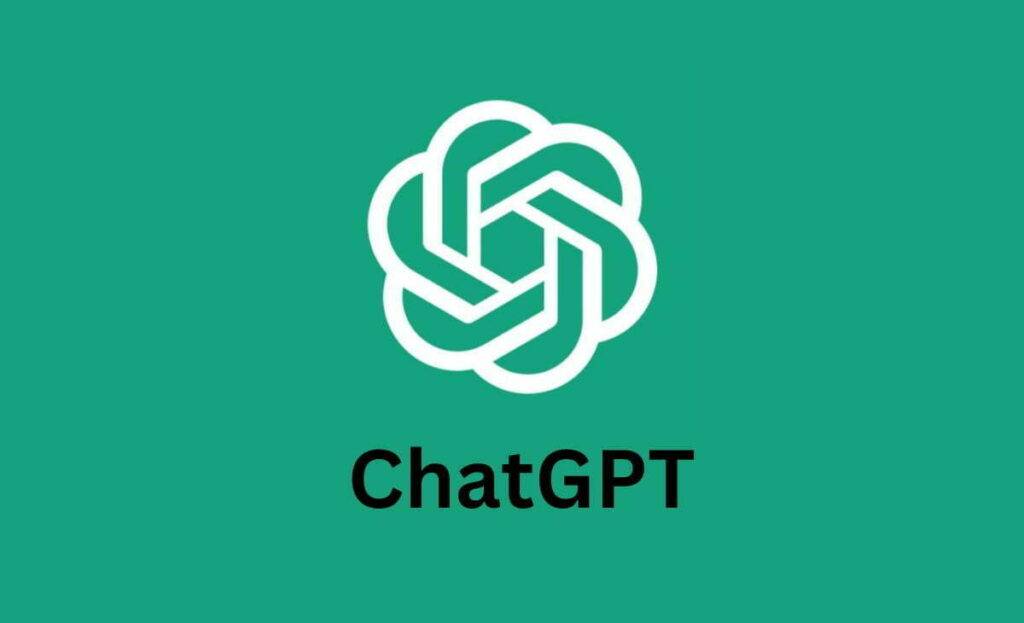
ChatGPT, developed by OpenAI, is a game-changer in the landscape of text-based data analytics. Its primary allure is its ability to understand and generate human-like text, making data analytics a breeze, especially when dealing with text-rich datasets. The core engine of ChatGPT is a Generative Pre-trained Transformer, which has been trained on diverse internet text. This training empowers it with a wide-ranging understanding of language, making it a robust tool for various data analytics tasks.
The pricing structure of ChatGPT is flexible, catering to both individual enthusiasts and professional setups. The basic plan is free, providing a taste of what ChatGPT can offer, while the ChatGPT Plus plan, priced at $20 per month, offers more uptime during peak hours, faster response outputs, and priority access to new features.
Use Cases in Data Analytics
The versatility of ChatGPT shines brightly when applied to data analytics. For instance, it can write simple data transformation scripts in Python or R using just simple natural language prompts. This feature is a godsend for marketers who might not have a strong coding background but need to engage in data analytics to glean actionable insights from data.
Moreover, its capability to process and analyze text-based data is unparalleled. Imagine having a tool that can sift through thousands of customer reviews, extract the sentiment, and present it in an easily digestible format. The time and resources saved are immense.
However, it’s essential to note the limitations. ChatGPT is a text-based model, which means it can’t interact with databases or execute actions outside of generating text. Also, the accuracy of generated code or analysis is highly dependent on the quality of the input it receives. It’s advisable to have a basic understanding of coding to effectively utilize ChatGPT for data analytics, especially when delving into more complex tasks.
2. Tableau (Tableau GPT and Tableau Pulse)
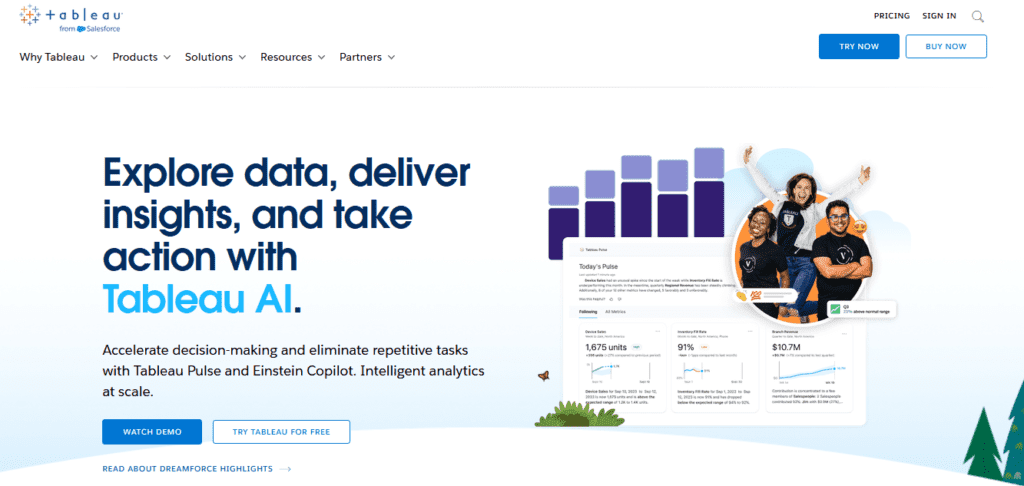
Tableau, a titan in the data visualization sector, has embraced the AI wave with its innovative offerings: Tableau GPT and Tableau Pulse. These tools infuse the power of generative AI into the already robust Tableau platform, unlocking new horizons in data analytics. Tableau GPT is a fusion of OpenAI’s enterprise-grade ChatGPT technology and Salesforce’s private AI models, a combination that promises a leap in data analysis, preparation, and governance. On the other hand, Tableau Pulse is designed to provide personalized metrics and insights driven by robust AI models, making the analytics process not only intuitive but also insightful.
The pricing for Tableau GPT and Tableau Pulse hasn’t been officially released as of their expected launch in Spring 2024. However, the buzz in the industry suggests that it would be competitively priced to align with the needs of both small teams and large enterprises.
Enhance Data Visualization and Analysis
The integration of AI in Tableau transforms the way data is visualized and analyzed. With Tableau GPT, routine processes such as data analysis and preparation can be automated, saving precious time and resources. This is particularly beneficial for marketers who are always on the lookout for real-time insights to make informed decisions. The AI-backed automation facilitates quick responses to market changes, a crucial advantage in today’s fast-paced business environment.
Tableau Pulse, on the other hand, personalizes the analytics experience. By offering personalized metrics and insights, it provides a tailored analysis that resonates with the specific needs and preferences of different users. This personalized approach makes data analysis less daunting and more engaging, especially for those who are new to the data analytics domain.
Moreover, the AI integrations in Tableau are not just about automation; they are about intelligent automation. They provide not just data, but insights, not just visuals, but stories. The AI can identify trends, patterns, and anomalies, providing a deeper understanding of the data at hand. This level of intelligence empowers marketers to not only see what’s happening but also understand why it’s happening, a critical aspect in devising effective marketing strategies.
The beauty of Tableau’s AI integrations is that they come without a steep learning curve. The user-friendly interface ensures that even those with limited technical knowledge can navigate through the platform and perform complex data analysis tasks. This lowers the entry barrier for many marketers who may not have a background in data science, opening up the realm of advanced data analytics to a broader audience.
3. Power BI
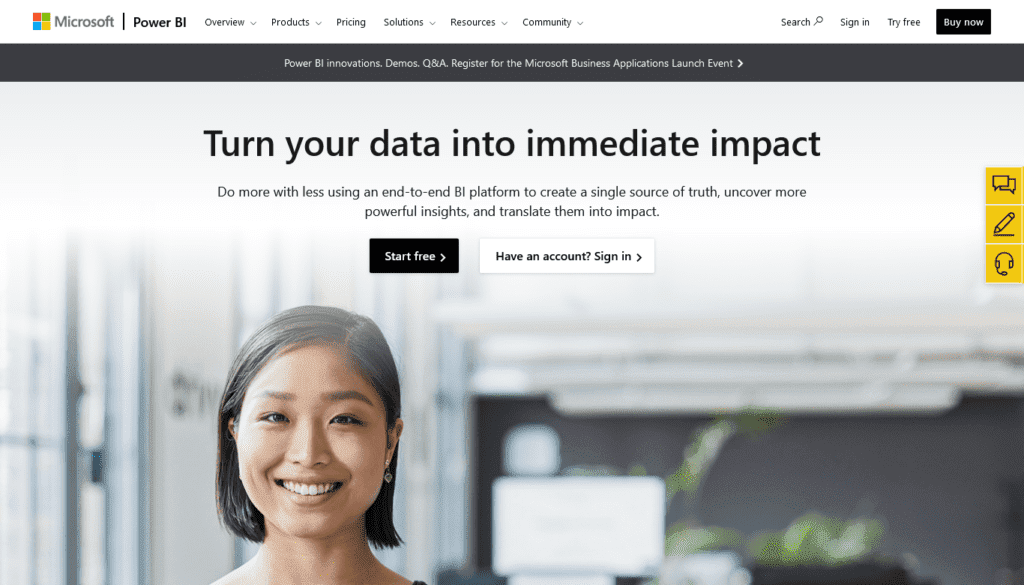
Power BI, a flagship product of Microsoft, stands as a formidable solution in the business intelligence arena. Its offerings are rich with features that enable robust data visualization, the creation of interactive dashboards, and sharing of insights across an organization. The addition of AI capabilities through AI Insights has propelled Power BI into a new realm of data analytics, providing a seamless platform for not just analyzing data but also deriving actionable insights from it.
One of the marquee features of Power BI is its AI Insights, which is integrated directly into Power BI Desktop. This feature brings a host of AI applications right into the hands of data analysts and marketers, including sentiment analysis, key phrase extraction, language detection, and image tagging. Moreover, Power BI offers a free trial along with several paid plans to cater to the varying needs of individuals and organizations.
AI Insights and Power BI Q&A Function
The AI Insights feature in Power BI is a game-changer for marketers. It automates several processes in Power Query, allowing for quicker and more efficient text analytics and computer vision tasks. For instance, the sentiment analysis function can be a powerful tool for marketers looking to gauge public sentiment on social media regarding a particular product or campaign.
Moreover, the Power BI Q&A function transforms the way data can be queried. Instead of delving into complex query languages, users can simply ask questions in natural language. For example, a marketer could ask, “What was the total revenue last quarter?” and the AI model in the backend would process the data to provide the answer. This feature not only makes data analysis more interactive but also more accessible to individuals who may not have advanced technical skills.
The interactive nature of Power BI, bolstered by its AI capabilities, facilitates a more intuitive and engaging data analysis experience. Marketers can quickly search and explore data, gaining insights in real-time to inform their strategies. This level of interactivity and ease of use is crucial in today’s data-driven marketing landscape, where being able to quickly interpret and act on data can provide a significant competitive edge.
Additionally, the integration of AI in Power BI extends the scope of data analytics from merely number-crunching to deriving meaningful, actionable insights. It’s not just about what the data shows; it’s about understanding the story behind the data, the trends, and the implications. And for marketers, understanding these narratives is crucial to crafting strategies that resonate with their target audiences and drive desired outcomes.
4. Microsoft Excel (Analyze Data and Microsoft 365 Copilot)
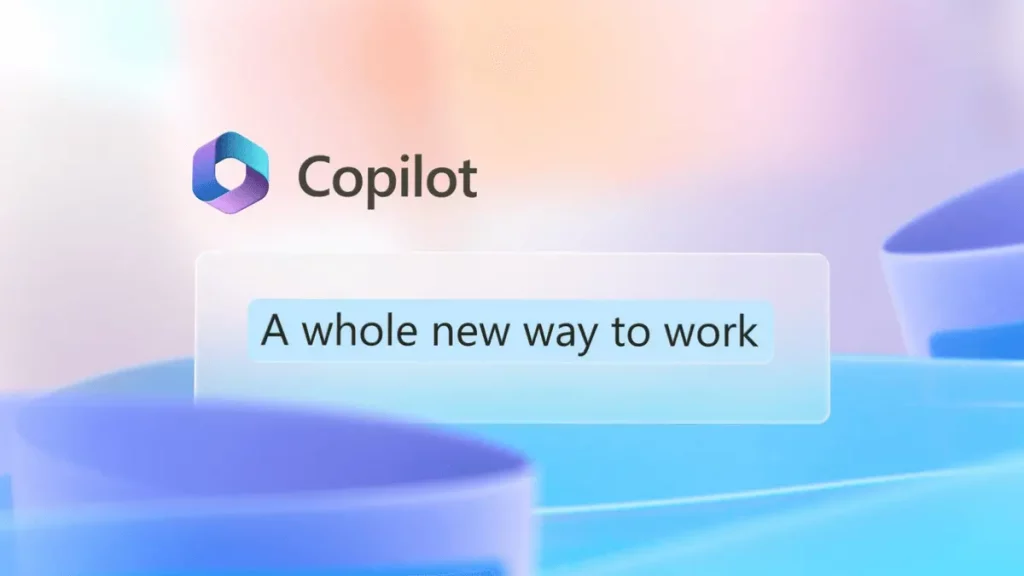
Microsoft Excel, a cornerstone in the data analysis world, has been a go-to tool for data enthusiasts and marketers alike for years. Its simplicity and powerful data manipulation capabilities have made it a staple in most business environments. With the advent of AI, Excel has not stayed behind. It introduced the Analyze Data feature back in 2018, allowing users to leverage AI to suggest tables, charts, graphs, and other visuals, making data comprehension a breeze.
Further enhancing its capabilities, Microsoft launched Microsoft 365 Copilot in March 2023, a Large Language Model (LLM) assistant designed to streamline workflows and answer queries across Microsoft applications, including Excel. With a starting price of $99 per year as part of the Microsoft 365 subscription, users get access to a wealth of features including these AI enhancements.
AI Features and Simplifying Data Analysis in Excel
The AI for data analytics features in Excel are nothing short of a boon for marketers. The Analyze Data feature takes away the grunt work from data analysis. By simply asking Excel about the fields they are interested in, users get a plethora of visuals that not only represent the data but do so in a manner that’s easy to understand and share. This means marketers can focus more on deriving insights rather than worrying about how to represent the data.
Microsoft 365 Copilot takes it a step further. Through a chat interface known as Business Chat, users can interact with their data in Excel using natural language. This feature is particularly useful for marketers who may not have advanced data analysis skills but need to extract insights from data. Asking a question like “What’s the trend of monthly sales?” and getting a visual representation helps in not only understanding the data better but also in making informed decisions quickly.
Moreover, the integration of Copilot within Excel bridges the gap between complex data analysis and everyday decision-making. Marketers can now delve into their data, ask questions, and receive answers in a format that’s easy to understand, without the need for advanced technical skills. This integration of AI in Excel is a testament to how AI for data analytics is making data analysis more accessible and actionable, catering to professionals with varying levels of expertise.
5. Jupyter AI
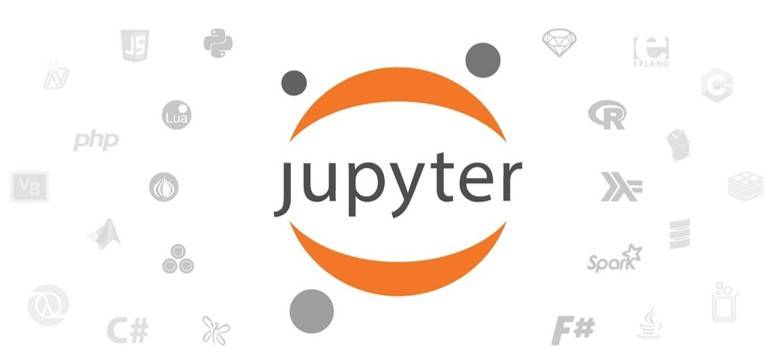
Jupyter AI is a breath of fresh air in the AI for data analytics landscape, especially for those who are well-versed in Python. This AI-powered extension for Jupyter Notebooks acts as a personal assistant to coders and data analysts, making the task of coding data analysis projects much more streamlined. It leverages generative AI models to provide a conversational assistant experience, which can be a game-changer when dealing with complex data analysis tasks. The best part? Jupyter AI is an open-source extension, making it a cost-effective solution for those looking to explore AI-powered data analysis without breaking the bank.
Conversational assistant for coding data analysis
The inception of Jupyter AI has turned the tables in favor of Python enthusiasts diving into the realm of data analytics. The tool serves as a conversational assistant, facilitating a more intuitive and interactive coding experience. For instance, if you’re tackling a data analysis project and hit a roadblock, Jupyter AI is there to assist, making suggestions and even generating code snippets to help you move forward. This is an invaluable asset for both seasoned coders and newcomers in the data analytics field.
Its support for common Integrated Development Environments (IDEs) like JupyterLab, Jupyter Notebook, Google Colab, and VSCode makes it a flexible tool, fitting seamlessly into your existing workflow. The conversational assistant can significantly cut down the time spent on coding, allowing you to focus on deriving actionable insights from your data. Moreover, its ability to integrate with familiar platforms ensures a smooth transition for those looking to enhance their data analysis process with AI capabilities.
Jupyter AI, with its user-friendly interface and powerful AI-backed capabilities, makes coding for data analysis less daunting and more engaging. It’s a shining example of how AI for data analytics is not just about automating tasks, but also about making the process more enjoyable and less cumbersome. By reducing the barriers to entry, Jupyter AI is playing a significant role in democratizing data analytics, making it accessible to a broader audience regardless of their technical prowess.
6. Polymer
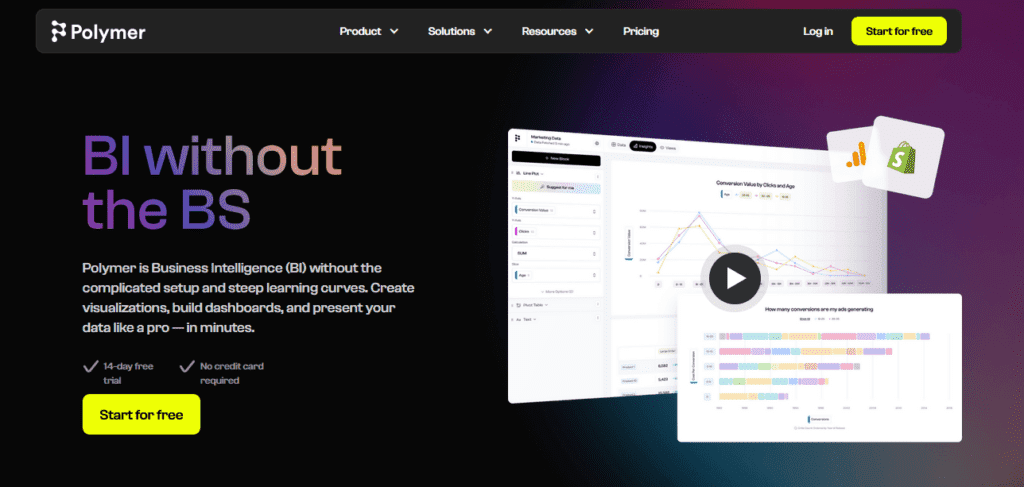
Polymer is an AI-driven platform dedicated to simplifying the realm of data visualization and business intelligence. At its core, it aims to democratize data analytics, making it accessible even to those with a non-technical background. The platform’s unique feature lies in its ability to automatically generate charts, tables, and maps from your dataset with just a few clicks. This automated data visualization capability is a huge time-saver and a boon for marketers looking to draw actionable insights swiftly.
When it comes to pricing, Polymer has structured its offerings into three tiers to cater to different needs: Starter, Pro, and Enterprise, priced at $10, $20, and $500 per month, respectively. This tiered pricing model makes it a viable option for a range of users, from individuals to large enterprises.
Easy Data Visualization and Business Intelligence
In the modern data-driven marketing landscape, the ability to quickly visualize data is paramount. Polymer shines brightly in this regard. Its intuitive interface allows marketers to create simple dashboards effortlessly, making the process of understanding and interpreting data a breeze. With just a few clicks, you can have a visual representation of your data, ready to be shared or analyzed further.
The platform is not only about creating visuals but also about understanding the story your data tells. Polymer’s automated visualization feature does the heavy lifting, allowing you to focus on deriving actionable insights rather than getting bogged down with creating visuals manually. This is especially crucial in a fast-paced marketing environment where time is of the essence.
Moreover, for marketers venturing into AI for data analytics, Polymer acts as a gentle introduction. Its user-friendly interface and automated features reduce the learning curve significantly, making it a go-to choice for those looking to integrate AI in their data analysis workflow without a steep learning curve.
Polymer’s offering is a testament to how AI is not merely a tool but a companion aiding marketers in navigating the vast ocean of data analytics. It embodies the essence of modern-day data analysis – swift, intuitive, and insightful, aligning perfectly with the needs of today’s agile marketer.
7. MonkeyLearn
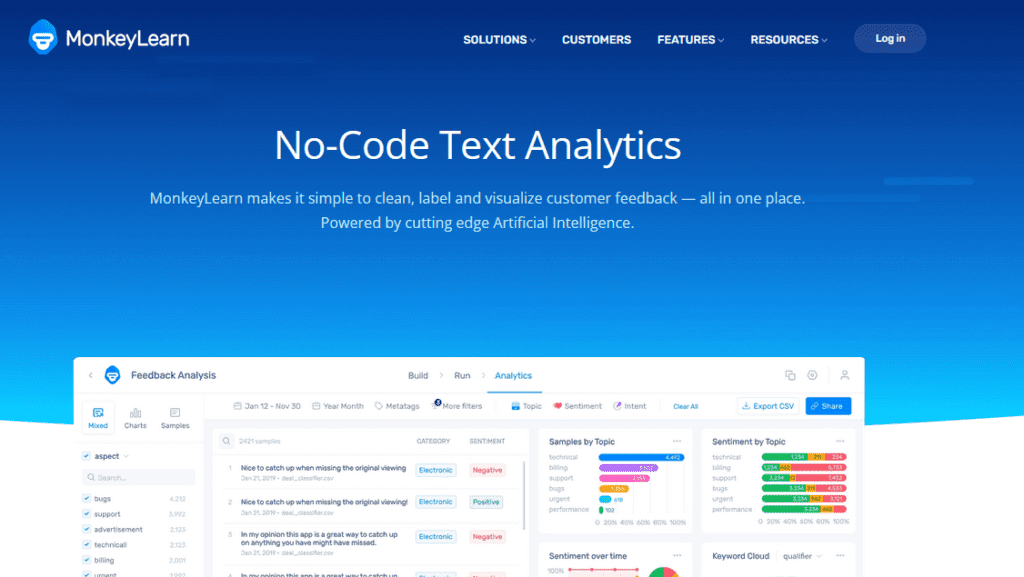
MonkeyLearn is a powerful platform that stands out in the crowded market of AI for data analytics tools due to its focus on text and data analysis. It caters particularly to marketers who are often faced with the challenge of deriving actionable insights from unstructured text data such as customer reviews, survey responses, or social media mentions. The unique feature of MonkeyLearn is its ability to effortlessly build and deploy custom models for sentiment analysis, intent classification, keyword extraction, and parts-of-speech tagging, providing a deeper understanding of textual data.
On the pricing front, MonkeyLearn offers a blend of options to suit various budgets and needs. There’s a free plan for those wanting to dip their toes in the water, and for more robust use, the Team plan comes in at $299, delivering a more comprehensive suite of tools and features.
Extracting Insights from Unstructured Data
In the marketing world, understanding consumer sentiment and feedback is crucial for shaping strategies and making informed decisions. MonkeyLearn excels at this by offering a suite of text analysis tools that dive deep into unstructured data to extract valuable insights.
The platform’s sentiment analysis tool, for instance, can sift through volumes of customer reviews to gauge the overall sentiment, providing a quick pulse on consumer satisfaction. Similarly, the keyword extraction tool can highlight the most frequently mentioned terms or phrases, shedding light on what aspects are catching the audience’s attention the most.
Moreover, the ease of building custom models allows marketers to tailor the analysis to their specific needs, a feature that’s invaluable in a field as diverse as marketing. Whether you are looking to classify customer feedback, extract key phrases from textual data, or understand the general sentiment, MonkeyLearn provides the tools to do so with a level of efficiency and accuracy that is hard to match.
The actionable insights derived from MonkeyLearn can be a game-changer for marketers, providing a deeper understanding of customer preferences, market trends, and areas of improvement. By harnessing the power of MonkeyLearn, marketers are not just analyzing data; they are unlocking a treasure trove of insights that can steer their strategies in a direction that resonates with their audience.
8. Qlik Sense
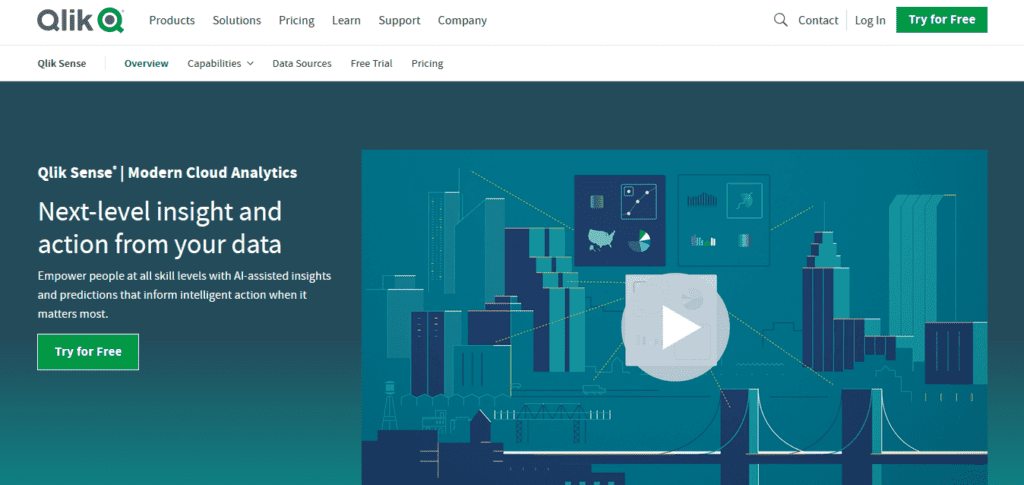
Qlik Sense is a remarkable business intelligence platform that employs AI for data analytics, transforming the way marketers and data enthusiasts approach data analysis. This tool seamlessly blends powerful AI capabilities with interactive data visualization features, offering a comprehensive toolkit for deriving meaningful insights from data. Qlik Sense’s unique feature is its guided data exploration, which significantly lowers the barrier to entry for individuals new to data analysis, making it a go-to choice for many marketers.
In terms of pricing, Qlik Sense offers various plans to cater to different needs. Their Qlik Sense Business plan, priced at $30/month billed annually, is an attractive option for small to medium enterprises looking to leverage AI in their data analytics endeavors.
Guided Data Exploration
The AI capabilities in Qlik Sense are not just about crunching numbers; they are about making data analysis intuitive and actionable. The platform offers automated insights for natural language processing (NLP), which is a boon for marketers dealing with text-based data. By quickly identifying trends in textual data, marketers can better understand customer sentiment and feedback, thereby making more informed decisions.
The guided data exploration feature is another highlight, providing a structured pathway for users to delve into their data. This is particularly useful for marketers who might not have a strong background in data analysis but are keen on extracting valuable insights from their data. With just a few clicks, users can explore different facets of their data, uncover patterns, and generate visual representations that tell a compelling story.
Furthermore, the conversational analytics through Insight Advisor Chat is a standout feature that allows users to engage with their data in a more interactive manner. By simply asking questions about the data, users receive insightful responses that aid in the decision-making process.
The mix of AI-powered analytics, guided data exploration, and conversational analytics makes Qlik Sense a formidable tool in the AI for data analytics landscape. It’s not just about providing data analysis solutions; it’s about empowering users, regardless of their technical expertise, to leverage data in making smarter, more informed decisions. This aligns perfectly with the evolving needs of marketers who are constantly seeking better ways to understand their market and audience.
9. Kanaries RATH
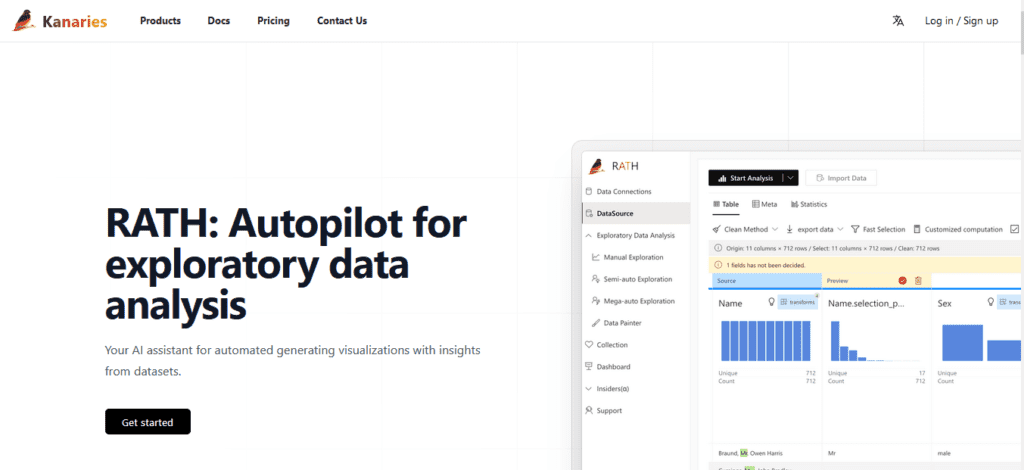
Kanaries RATH is an AI assistant specifically crafted to serve the needs of those engrossed in exploratory data analysis. This tool stands out in the AI for data analytics domain by its ability to generate data visualizations without requiring a single line of code. The ease of use that comes with Kanaries RATH is unparalleled, especially for marketers who might not have a technical background but are eager to delve into data analytics.
The unique feature of Kanaries RATH is its Data Painter, which eases the exploration of data, helping users find the most meaningful ways to visualize it. Moreover, its AI-enhanced data cleaning during the preparation phase is a game-changer, ensuring that the data you work with is pristine and reliable.
In terms of pricing, Kanaries RATH offers both a free and a paid plan at $10 per month, making it a cost-effective solution for individuals and small teams looking to get started with data analytics.
AI-Enhanced Data Cleaning Features
The automation that Kanaries RATH brings to the table is nothing short of revolutionary. The automated data visualization feature is a boon for marketers, as it allows them to see the story behind the numbers swiftly. With just a few clicks, Kanaries RATH can translate complex datasets into visually appealing and understandable charts and graphs. This feature is essential for marketers who are often required to share data insights with teams and stakeholders who might not have a data analytics background.
Furthermore, the AI-enhanced data cleaning feature is a true time-saver. Cleaning and preparing data is a crucial yet time-consuming part of the data analytics process. However, with Kanaries RATH, much of the grunt work is taken care of automatically, allowing you to focus on deriving insights rather than getting bogged down with data preparation.
In addition, the inclusion of PyGWalker—a no-code visual analysis interface in Jupyter Notebook, in its free plan, demonstrates Kanaries RATH’s commitment to making data analytics accessible to a broader audience.
Kanaries RATH essentially streamlines the initial stages of the data analytics process, making it a valuable tool for anyone looking to delve into AI for data analytics without getting entangled in the technical intricacies. The blend of automated visualization and AI-enhanced data cleaning is a solid proposition for marketers seeking to harness the power of data in their strategies.
The AI Revolution in Data Analytics
The voyage from traditional data analytics to AI-driven analysis hasn’t been a sudden leap, but a steady and remarkable evolution. Over the years, I’ve switched from manually combing through spreadsheets to leveraging AI for data analytics, and the shift has been game-changing. The manual scrutiny of data, which was once a norm, is now considered an archaic practice.
Now, why is AI such a big deal in data analytics? Well, AI technologies, especially machine learning and deep learning, have empowered data analysts and marketers like never before. The capability to process vast datasets swiftly and derive meaningful insights is nothing short of revolutionary. My journey began with simple tools, but as I ventured deeper, the complexity of data demanded a robust solution. That’s when AI tools for data analytics became my go-to.
The benefits are numerous and quite profound:
- Efficiency and Speed: AI significantly cuts down the time required to process and analyze data. What took days, now takes mere hours or minutes. It’s like having an army of data analysts working tirelessly around the clock.
- Predictive Analysis: AI has the uncanny ability to forecast trends based on historical data. This feature has been a boon for my marketing campaigns, enabling data-driven decision-making that was on target.
- Accuracy: The precision with which AI tools analyze data is remarkable. The reduction in human error, a common issue in manual data analysis, is a significant advantage.
- Cost-Effectiveness: Initially, I was hesitant about the cost factor, but the ROI delivered by AI in data analytics is substantial. The automation of routine tasks frees up time for focusing on strategic initiatives.
- Enhanced Decision-Making: With AI, the quality of insights has skyrocketed, leading to more informed and timely decisions. It’s like having a crystal ball that provides a peek into market trends.
However, amidst these accolades, there are challenges:
- Data Privacy: With great power comes great responsibility. Ensuring the privacy and security of data is paramount, and navigating the regulatory landscape can be tricky.
- Cost of Implementation: The upfront cost of implementing AI tools can be steep, especially for small to medium enterprises. Although the long-term benefits outweigh the initial costs, it’s a factor worth considering.
- Learning Curve: There’s a learning curve involved in understanding and effectively utilizing AI tools. It requires a shift in mindset and, in some cases, upskilling to get the hang of these advanced tools.
The landscape of data analytics has been irreversibly altered by AI technologies, opening new doors of possibilities. The ability to sift through data mountains and draw out nuggets of actionable insights has been nothing short of a magic wand for my marketing strategies. And as AI continues to evolve, the frontier of what’s possible keeps expanding.
Unearthing the potential of AI for data analytics was akin to stepping into a new era of endless opportunities. And while challenges exist, the pros far outweigh the cons, making the AI revolution in data analytics a journey worth embarking on.
Benefits and Applications of AI in Data Analytics
The integration of Artificial Intelligence (AI) in data analytics is akin to adding a supercharger to an already powerful engine. These AI tools, as reviewed, bring forth a plethora of benefits that significantly augment the capability of data professionals and marketers in predictive modeling, segmentation analysis, and other analytical tasks.
The first and foremost advantage is the automation of repetitive and mundane tasks. This automation is not just a time-saver, but it also ensures accuracy and consistency, which are critical in data analytics. For instance, the AI-enhanced data cleaning feature in Kanaries RATH is an exemplification of how AI can automate the tedious task of data preparation, allowing professionals to focus more on analysis and interpretation.
Predictive modeling is another area where the integration of AI shines brightly. Tools like Power BI and Tableau provide robust platforms for developing predictive models, helping businesses forecast trends, and make data-driven decisions. The accuracy and efficiency of predictive modeling are significantly enhanced with the aid of AI, providing more reliable forecasts at a faster pace.
Segmentation analysis is elevated to a new level with AI integration. AI enables a more nuanced and sophisticated segmentation of data, which is crucial for marketers to target the right audience with tailored messages. For instance, the AI capabilities in Qlik Sense facilitate a deeper dive into data, enabling the uncovering of insightful segments that might go unnoticed with traditional analysis methods.
The real magic happens when these tools are employed in real-world scenarios. For instance, a retail giant could employ Tableau’s AI integrations to analyze customer purchasing behavior over time, identify distinct segments, and then tailor marketing strategies for each segment to boost sales and customer satisfaction.
Similarly, a healthcare organization could leverage Power BI’s predictive modeling to forecast patient admission rates, enabling better resource allocation and ultimately, better patient care.
Moreover, the ease of text analysis with tools like MonkeyLearn could be utilized by a marketing agency to dissect customer reviews and social media mentions, providing invaluable insights into consumer sentiment and areas for improvement.
In a nutshell, the fusion of AI with data analytics tools not only augments the analytical capabilities but also provides actionable insights that can drive better business decisions. The real-world applications are boundless, and as these AI tools continue to evolve, the horizon of what’s achievable with AI for data analytics continues to expand, creating a promising avenue for businesses and professionals alike to explore and exploit.
Considerations and Challenges
Venturing into the realm of AI for data analytics comes with its share of considerations and challenges that need thorough attention to harness the full potential of this technology. Here are some pivotal points to ponder:
Data Quality and Bias
The adage “Garbage In, Garbage Out” holds true in the domain of AI. The quality of insights derived is directly proportional to the quality of data fed into these AI tools. Inaccurate or incomplete data can lead to misleading results which could be detrimental to decision-making. Moreover, bias is a lurking menace. AI tools learn from historical data, and if that data carries inherent biases, the AI models will inadvertently perpetuate those biases, leading to skewed insights.
Ethical Considerations
The ethical implications of AI in data analytics are profound. As AI tools become more intertwined in decision-making processes, the accountability for the outcomes derived from AI analyses becomes a grave concern. For instance, if an AI-driven analysis leads to a biased hiring decision or unfair lending practices, the ethical repercussions are significant. Therefore, it’s crucial to establish a clear ethical framework surrounding the use of AI in data analytics.
Data Privacy and Security
With the burgeoning use of AI in analyzing vast swathes of data, the concerns surrounding data privacy and security have magnified. Protecting sensitive information while leveraging AI tools for analysis is a delicate balancing act. Ensuring robust encryption, adhering to data privacy laws like GDPR, and being transparent with stakeholders about how their data is being used are crucial steps in maintaining data privacy and security.
The Learning Curve and Resource Allocation
Implementing AI tools in data analytics workflows is not a plug-and-play affair. It requires a substantial investment of time and resources in learning the intricacies of these tools, and in some cases, a paradigm shift in how data analytics is approached. Moreover, the resource allocation for managing and maintaining these AI systems is a vital consideration for organizations.
Transparency and Explainability
As AI models become more complex, the “black box” problem becomes more pronounced. It’s essential that the AI tools used in data analytics have a level of transparency and explainability, so that stakeholders can understand how conclusions are being drawn. This is crucial for building trust in AI-driven decision-making processes.
In conclusion, while the benefits of integrating AI in data analytics are substantial, navigating through the accompanying challenges requires a well-thought-out strategy, a robust ethical framework, and a continuous commitment to learning and adaptation.
Conclusion
The journey through the landscape of AI for Data Analytics unveils a realm rich with potential, capable of revolutionizing the way we approach data analysis. The suite of tools discussed herein offers a glimpse into the future, where tedious data tasks are automated, insights are gleaned swiftly, and decision-making is propelled to new heights.
The promise of enhanced predictive modeling, robust segmentation analysis, and the bounty of actionable insights are just the tip of the iceberg. As a savvy marketer or an AI enthusiast, diving into these tools can significantly upskill your data analytics game.
The road ahead beckons with promise; it’s time to roll up your sleeves, explore these AI tools, and unlock a new level of data intelligence that could be a game-changer for your endeavors. Your voyage into the heart of AI-driven data analytics begins now – are you ready to take the leap?
